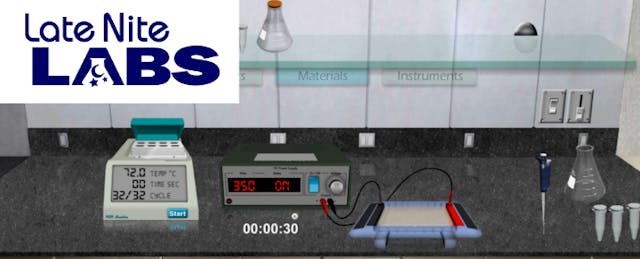Macmillan New Ventures is acquiring New York City-based virtual science lab startup, Late Nite Labs. Both declined to disclose the price.
Late Nite Labs has been a heralded edtech startup, both a bit older and more substantial than many of its kin. Its software lets students perform "virtual" experiments in physics, chemistry and microbiology by using sophisticated simulation models. Students follow lab procedures--and thanks to the underlying computation model--will get different results depending on how well they followed procedures. (Here's a demo of bacterial growth.)
Some edtech watchers will decry the sale of Late Nite Labs as another sign of the decline of the industry. But that conclusion would blur important subtles of the edtech market.
After two years of heavy startup activity fueled by investments measured in tens of thousands of dollars, many companies are indeed struggling to grow up. "The theory is that a lot of edtech companies plateau at the $8 to $15 million [revenue] level and need a major strategic partner," notes Troy Williams president of Macmillan New Ventures. "We've even seen a few come through at the $3 million to $10 million (revenue) that have already plateaued," he adds.
Some companies will close up shop or be shut down by their investors (such as Alleyoop and likely, Virtual Nerd). Some will make significant changes in their approach or business model (such as Fidelis). Others will sell their assets (such as Lore). Still others will get rolled up by private equity groups (SchoolRack).
Many will brew a veritable alphabet soup of funding rounds. And many more will try to sell themselves to a larger operation. The trick is finding a partner who believes in the product, approach and team almost as much as the founders did. All too frequently, the goal of the acquiring partners is to generate cash.
In June 2012, Macmillan New Ventures laid out its plan to build a portfolio of ten to 15 edtech companies over a three to five-year period. Within the past year, Macmillan acquired two edtech companies: EBI Map Works and Sapling Learning. (Its edtech portfolio already included iClicker and PrepU.)
"We're trying to look at the size the opportunity and capture companies that have market adoption and can prove efficacy--not just ones showing off 'cool' stuff," says Williams. "There's a lot of cool stuff that comes through the door. We're looking for products that genuinely help students learn, when (the companies) are still on that rising tide."
That's what he saw when he took a close look at Late Nite Labs. "We liked the fully immersive interactivity. These guys have done it well. We felt we bought the best in the marketplace. Everyone else in the simulation space has 'hardcoded' the results."
No canned demos are allowed at Late Nite Labs. The company was started in 2006 in Israel by David Jaffe, who spent five years developing the computational engine that underlies Late Nite Labs. In 2011, with encouragement from Harris Goodman, who became head of business development, Jaffe returned to the US. The team scored $1.1 million in funding from a collection of investors including Palm Ventures, Harold Levy, (the former Chancellor of New York City’s public school system and EVP of Kaplan), Don Burton (former head of Business Development for Disney Education) and investor, Matt Greenfield. They expanded to about a dozen people.
Fast forward to January 2013: Goodman tracked Williams down at the Consumer Electronics Show. Williams liked Late Nite's approach and the fact that the company was selling its software to students and institutions. (Price of Late Nite Labs? It's $50 per semester for students and no cost for teachers. Plus free 24/7 support.) Schools use Late Nite labs when they can't afford a traditional "wet" lab. They also use it to supplement live lab experiences and give students a chance to either prep or review a lab were they've already completed the prep work.
Late Nite Labs also met final criteria for demonstrating growing momentum: surpassing an annualized revenue rate of $1 million.
Harris, Jaffe and the rest of the dozen team members are convinced that Macmillan will let them continue building their product. "This deal meant we could accelerate what we're doing and be able to put out the same or better quality products," Harris says. "We want to be putting out more science curriculum. We've got biology and microbiology. We're building physics with Penn State. We're supposed to do astronomy with Arizona State University. Macmillan gives us the bandwidth to do this."


